Medication Adherence
As former Surgeon General C. Everett Koop said, “Drugs don’t work if patients don’t take them.” Reasons for medication nonadherence include complex dosing regimens, poor health professional–patient communication, use of hard-copy prescriptions, and the cost of medication.
Numerous strategies, including educating patients, simplifying treatment, and coordinating patient care across the health care team, can improve adherence.
Featured Tools
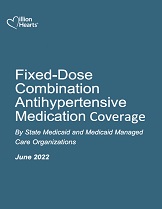
Fixed-Dose Combination Antihypertensive Medication Coverage By State Medicaid and Medicaid Managed Care Organizations (June 2022)
This policy analysis provides coverage information for fixed-dosed combination (FDC) antihypertensive medications for Medicaid and Medicaid Managed Care Organizations for 50 states and Washington, DC. The FDC state summaries can be used to update health center and other Medicaid provider formularies, educate clinicians about the effectiveness and availability of covered FDCs for managing patients with hypertension, and embed covered FDCs into clinical workflows.
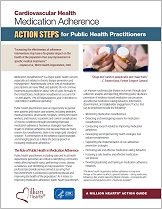
Medication Adherence: Action Steps for Public Health Practitioners
This guide provides a call to action for public health practitioners to support evidence- and practice- based medication adherence strategies that improve blood pressure control. Additional resources and references for each action step are also included in this guide.
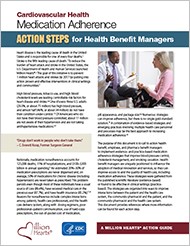
Medication Adherence: Action Steps for Health Benefit Managers
This guide provides a call to action for health, employer, and pharmacy benefit managers to implement evidence- and practice-based medication adherence strategies that improve blood pressure control, cholesterol management, and smoking cessation. Additional resources and references for each action step are also included in the guide.
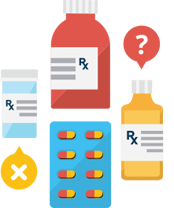
Medication Adherence: Interactive Module for Health Care Providers
This online module from the American Medical Association provides eight steps to improve medication adherence. Moving through the module, providers can find answers to common questions about how to involve staff and patients in identifying nonadherence and changing behaviors.
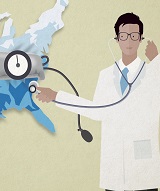
Medication Adherence Video: Help Patients Take Blood Pressure Medicine As Directed
One major cause of ineffective blood pressure control is poor medication adherence, or patients not taking their medications at the right time and in the right amount. Learn strategies to help your patients improve their blood pressure control.

Medication Adherence Video: Tips for Taking Blood Pressure Medicines As Directed
High blood pressure (hypertension) is one of the leading causes of heart disease, stroke, kidney disease, and death in the United States. One major cause of poor blood pressure control is not taking medications at the right time and in the right amount. Learn the steps you can take to help you or your loved ones.
For Patients and Families
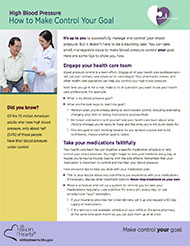
How to Make Control Your Goal
Cómo hacer que controlarla sea su meta
Share these hypertension control tip sheets with your patients to encourage them to make control their goal.
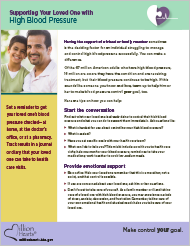
Supporting Your Loved One with High Blood Pressure
Cómo apoyar a un ser querido con presión arterial alta
Caregivers and family members play an important role in keeping hypertension under control.
References and Resources
- Vital Signs: Disparities in Antihypertensive Medication Nonadherence Among Medicare Part D Beneficiaries — United States, 2014 [PDF – 958K]
This article describes nonadherence rates of Medicare Part D beneficiaries taking antihypertensive medication and illustrates regional variation across the U.S. (Morbidity and Mortality Weekly Report, September 2016) - Overcoming Barriers to Medication Adherence for Chronic Diseases
February 2017
The Centers for Disease Control and Prevention hosted a Public Health Grand Rounds. The webcast featured a panel of leaders in pharmacy, nursing, medicine, and academia who highlighted the burden of medication nonadherence and barriers for adherence among patients with cardiovascular disease and other chronic diseases. Watch the archived webcast. - Factors That Promote Antihypertensive Medication Adherence, 2009 vs. 2014[PDF – 1M]
This data snapshot shows improvements and areas for improvement in trends for antihypertensive medicine (AHM) and compares the number of AHM fills with low or no copays for that period. (Million Hearts®, September 2016) - Medicines to Help You: High Blood Pressure[PDF – 533K]
This booklet lists every medicine approved to treat high blood pressure, along with side effects, warnings, and other information. The booklet is designed to initiate conversations between providers and patients. (Food and Drug Administration, May 2011)
Success Stories
Several Million Hearts® partners and programs have demonstrated success in helping patients improve medication adherence. Read more about these strategies and programs.
